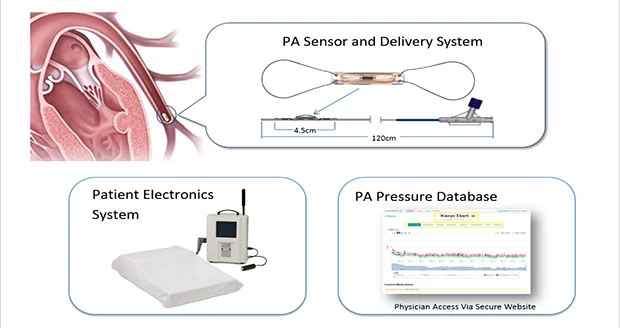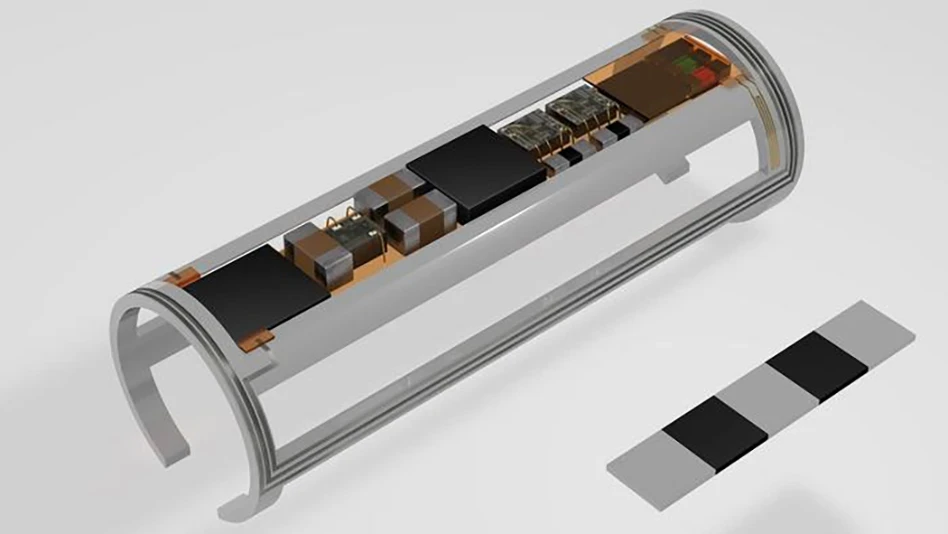
Washington, D.C. – The U.S. Food and Drug Administration (FDA) approved the CardioMEMS HF System that measures the pulmonary artery (PA) pressures and heart rates of patients with New York Heart Association (NYHA) Class III heart failure who have been hospitalized for heart failure in the previous year. The device allows health care professionals to monitor the condition of their patients remotely.
About 5.8 million people in the United States have heart failure, a condition in which the heart cannot pump enough blood to meet the body's needs. With proper treatment and lifestyle changes, people with heart failure can live longer and more active lives. The NYHA Functional Classification further defines the extent of heart failure in patients. Patients with Class III heart failure experience marked limitation in physical activity, even during less-than-ordinary activity such as walking short distances.
The CardioMEMS HF System is used by the patient in the home or other remote location. This is the first permanently implantable wireless system intended to provide PA pressure measurements, including systolic, diastolic, and mean PA pressures. The PA pressure data are reviewed by physicians who can make decisions regarding the status of the patient and, if necessary, initiate changes in medical therapy, with the goal of reducing hospitalization due to heart failure.
The system consists of three parts:
- A battery-free Implantable Sensor/Monitor implanted permanently in the PA;
- Delivery System, a transvenous catheter designed to deploy the Implantable Sensor, within the distal PA; and
- CardioMEMS Hospital and Patient Electronics Systems where the Electronics System acquires and processes signals from the Implantable Sensor/Monitor and transfers PA pressure measurements to a secure database.
“Heart failure is one of the most common reasons for hospitalizations for people aged 65 and older,” said Christy Foreman, director of the Office of Device Evaluation in the FDA’s Center for Devices and Radiological Health. “The goal of this first-of-its-kind implantable wireless device with remote monitoring of pulmonary artery pressure is to reduce heart failure-related hospitalizations.”
To support the approval, the company submitted data from its pivotal clinical study. Concerns about the clinical study were discussed at the December 8, 2011 meeting of the Circulatory System Devices Panel of FDA’s Medical Devices Advisory Committee. The company provided additional follow-up data and analyses that were discussed at the October 9, 2013 meeting of the Circulatory System Devices Panel to address these concerns.
The clinical study, in which 550 participants had the device implanted and were randomized into either the control group or investigational group, showed a clinically and statistically significant reduction in heart failure-related hospitalizations for the participants whose doctors had access to pulmonary artery pressure data. Of the participants who had the device implanted (or in whom there was an attempt to implant the device), 98.6 percent were free from device/system-related complications at six months. Of the devices implanted, 100 percent were operational at 6 months, and there were no device explants or repeat implants during this time period.
The FDA believes that there is reasonable assurance that the device is safe and effective for heart failure management with the goal of reducing the rate of heart failure-related hospitalizations in certain patients. The FDA is requiring a thorough Post-Approval Study to continue to learn about the device’s performance when used outside the context of a clinical study.
Source: FDA
Latest from Today's Medical Developments
- ModuleWorks' 2024.12 software components
- Stretchable, flexible, recyclable – this plastic is fantastic
- Discuss the upcoming year in manufacturing with GIE Media editors
- TDK Ventures invests in ANYbotics
- Our first webinar of 2025 highlights additive manufacturing
- Costa Rica, a global magnet for medical devices
- PhD student helps develop medical device for children with congenital heart defects
- Happy New Year





